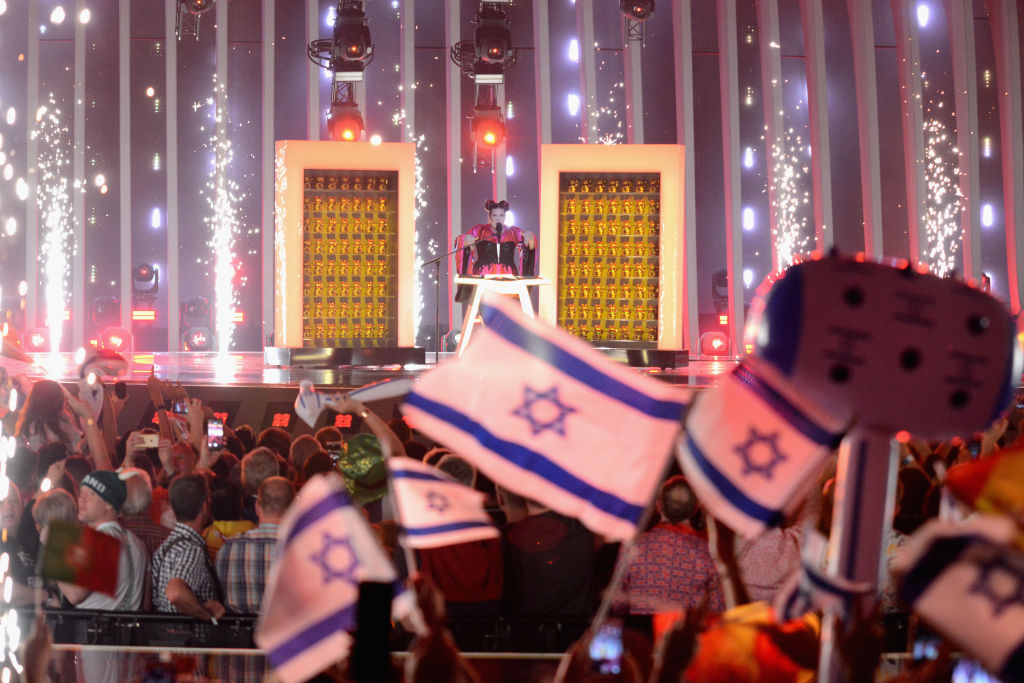Kobi Marimi, the 27-year-old Tel Avivian singer, picked to represent Israel at this month’s Eurovision Song Contest, can’t stop smiling:
‘I love my country. I love Tel Aviv. To know that I’m achieving a dream of mine, to be a part of Eurovision, it’s amazing in itself’, he tells me, with an earnestness that could crack the biggest Eurovision cynic. ‘But to know that I’m doing it in my country, my own city, it’s even greater than that.’
But not everyone is quite so enthusiastic about Eurovision being held in the Holy Land. While politics can’t help but creep into the contest each year, this time around feels different as the Jewish State – loathed by its regional foes and right-on Western activists alike – sets about putting on the campest show on Earth.
Israel’s inclusion in the contest has riled neighbouring states ever since it first competed in 1973. Lebanon was due to make its Eurovision debut in 2005, but refused to show the Israeli entry on TV. It pulled out and has still never competed. In 1978, Jordanian TV cut to pictures of flowers during Israel’s performance. As it became clear that Israel was going to win, the transmission was cut off entirely and Jordan named runner-up Belgium the winner.
Anti-Israel sentiment has long since gone global. The Boycott, Divestment and Sanctions (BDS) movement which calls for an economic, academic and cultural boycott of Israel has urged competing nations to pull out of Eurovision this year. Prominent artists and musicians in Britain, Ireland, Sweden and elsewhere promptly backed the call.
Meanwhile, others are trying to disrupt proceedings from within. Iceland’s Eurovision act this year, an anti-capitalist techno band called Hatari, say their entry is a protest against the Israeli government, even though it makes no mention of Israel. They have also challenged recently re-elected prime minister Benjamin Netanyahu to a bout of Icelandic trouser wrestling.
This Eurovision comes after another year of controversy for Israel, from Donald Trump opening the new US embassy in Jerusalem (and recognising the Golan Heights) to the passing of the ‘nation state law’ to more killings of Palestinian protesters at the border fence.
The BDS movement claims that the government is trying to use Eurovision to ‘whitewash’ its ‘war crimes against Palestinians’. But talking to the organisers in the Expo Tel Aviv centre, where the contest will be held next month, this couldn’t be further from the truth.
Zivit Davidovitch, executive producer of the contest for the Israeli public broadcaster KAN, is visibly irked when I put BDS’s claim to her. ‘It’s not a political event at all’, she says. ‘The government is not even paying for it, although they should.’
For the first time in Eurovision history, she claims, the government of the host nation is refusing to bankroll the show. The Israeli government first demanded KAN pay for it out of its existing budget and only later, begrudgingly, offered it an extra loan. A few weeks ago, works on the stage ground to a halt after money for venue security dried up. If the Israeli state wanted to use Eurovision as a propaganda piece, you’d have thought it would have been a bit more generous.
BDS’s cultural boycott has chalked up some significant victories recently. US alt-pop star Lana Del Rey pulled out of an appearance at a Tel Aviv festival last year following a backlash from Pink Floyd bassist and leading BDS campaigner Roger Waters. New Zealand wunderkind Lorde also followed suit.
BDS argues that performing in Israel or working with Israeli cultural institutions helps ‘create the false impression that Israel is a “normal” country’. All forms of cultural exchange with Israel are deemed off limits, justified on the premise that it is a uniquely vicious ‘apartheid state’.
Whether or not you buy such claims is beside the point. The fact is this boycott singles out Israelis for collective punishment, treating them as mere extensions of their own government in a way that we do not do for any other nation or people, no matter how authoritarian their leaders.
Yigal Ravid, a veteran Israeli presenter, journalist, and host of the last Israeli Eurovision in 1999, can’t help but see this double standard as deliberate. ‘I do believe that it has something to do with anti-Semitism. It hurts me to say it’, he says. Ravid says he isn’t referring to anyone in particular. But he does feel particularly betrayed by Waters, of whom he is a lifelong fan. ‘I am the guy who took the money that I got for my Bar Mitzvah and bought The Dark Side of the Moon’, he says. ‘I grow up, and here is my hero turning against me.’
This apparent collision of the world’s biggest (non-sports) TV event and the world’s oldest hatred leaves a foul taste. Bigotry and Eurovision fun is not a good mix. But most of the Israelis I talk to think that – a few stunts aside – everything will be alright on the night. And few are letting it get to them. Least of all Kobi. When I ask what his message is to the boycotters, he is optimistic – or at least diplomatic. ‘We all know that Eurovision is not a political contest… this is about being together, and about love, and love for music, and I hope that they will be able to see that for themselves.’
For some Brits, Eurovision is just an annual reminder of the depth of anti-British prejudice. (More than two decades of hurt at the contest apparently have nothing to do with a remarkably dreadful slew of singer and song choices.) But the lot of the Israelis this year rather puts things in perspective.
Nul points is one thing. BDS is quite another.







Comments